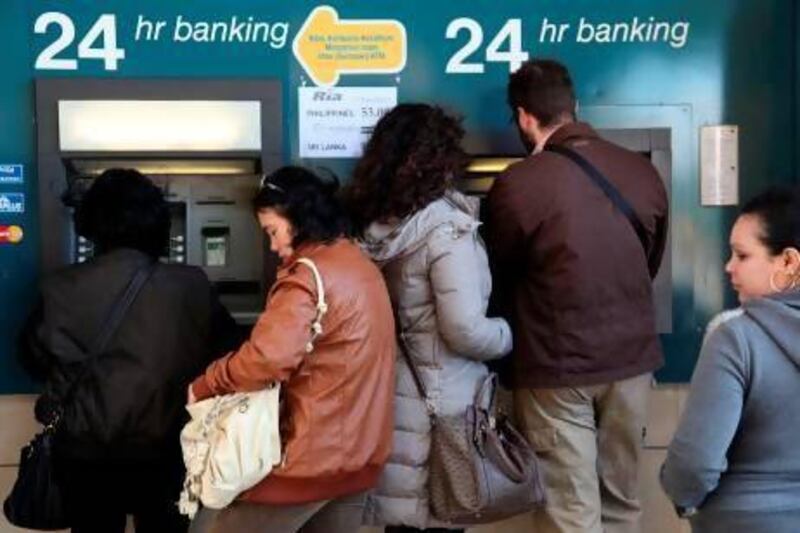NICOSIA // Furious Cypriots marched on the presidential palace last night in protest at a plan to seize up to 10 per cent of their bank savings as part of an EU bailout.
Several hundred gathered outside parliament chanting "thieves, thieves" and "people wake up, they're drinking your blood". One protester dumped sheep wool and animal excrement in front of a line of police officers guarding the entrance.
Banks have been closed since the bailout deal was announced at the weekend and customers desperate to withdraw cash have emptied ATMs. Cypriot authorities delayed a parliamentary vote on the bank levy and ordered the banks to remain shut until Thursday while it tries to modify the deal to placate savers.
But the plan has already sent shock waves across Europe as families realised the money they have in the bank may not be safe.
"The damage is done," said Louise Cooper, who heads the financial research firm CooperCity. "Europeans now know that their savings could be used to bail out banks."
Cyprus's €10 billion (Dh47bn) bailout agreed at the weekend by the EU and IMF had demanded that all bank customers pay a one-off levy of between 6.75 and 9.9 per cent, dismaying and infuriating Cypriots and ringing alarm bells abroad. It broke with previous EU practice that depositors' savings were sacrosanct.
Abroad, the worst fear is that savers in larger European countries become nervous and start withdrawing funds, although there was no immediate sign of that yesterday.
US economist Paul Krugman wrote in The New York Times: "It's as if the Europeans are holding up a neon sign, written in Greek and Italian, saying 'Time to stage a run on your banks!'"
The Cyprus government was last night working on a plan to soften the blow to smaller savers by tilting more of the burden towards those with deposits of more than €100,000 – many of them Russians who value Cyprus as a low-tax offshore base.
Reportedly, under the latest proposal, deposits of less than €20,000 euros would be exempt from a bank levy, while accounts of up to €100,000 euros would be taxed at 6.7 per cent and those above that amount would be taxed at 9.9 per cent.
Eurozone officials indicated that changes to the deal would be acceptable as long as the return of around €6bn euros is maintained.
But the bailout plan prompted an angry response from the Russian president, Vladimir Putin, who called the proposed levy "unfair, unprofessional and dangerous".
Russian corporate and individual investors in Cyprus could lose up to US$3bn, economists said.
The Cypriot president, Nicos Anastasiades, a conservative who was elected just three weeks ago, said in televised address to the nation on Sunday night that the levy on savings was an alternative to bankruptcy. It was "painful, but "will eventually stabilise the economy and lead it to is recovery".
He said Cyprus was facing its worst crisis since Turkey invaded the north of island in 1974, splitting the island to this day.
Editorials in several Cypriot newspapers said Mr Anastasiades had been "blackmailed" by the EU, which had "held a gun" to his head during bailout negotiations.
"The EU offered a 'rescue package' that is designed to destroy rather than rescue what is left of the Cyprus economy," the Cyprus Mail said.
But opposition leaders also blamed the president. He had "betrayed the people's vote" by agreeing to the deal, proclaimed George Lillikas, an independent.
Approval of the bailout plan in Cyprus's fractious 56-member parliament is far from given. No party has an absolute majority. The president's party has 20 seats in the assembly and needs other parties' support to ratify the deal. Three of these said they would not back the bailout as it stood.
A vote initially planned for Sunday was twice been rescheduled to give more time to build a consensus.
Savers who lost money would be compensated by shares in commercial banks, with equity returns guaranteed by future revenues expected from natural gas discoveries, Mr Anastasiades said. Turkey, however, disputes Cyprus's drilling rights.
But many legislators remained unconvinced. "Essentially, parliament is called to legalise a decision to rob depositors blind, against every written and unwritten law," said Yiannakis Omirou, the parliamentary speaker who heads a EDEK, a small Socialist party. "We refuse to subscribe to this."
mtheodoulou@thenational.ae, with additional reporting by Associated Press
twitter: For breaking news from the Gulf, the Middle East and around the globe follow The National World. Follow us






